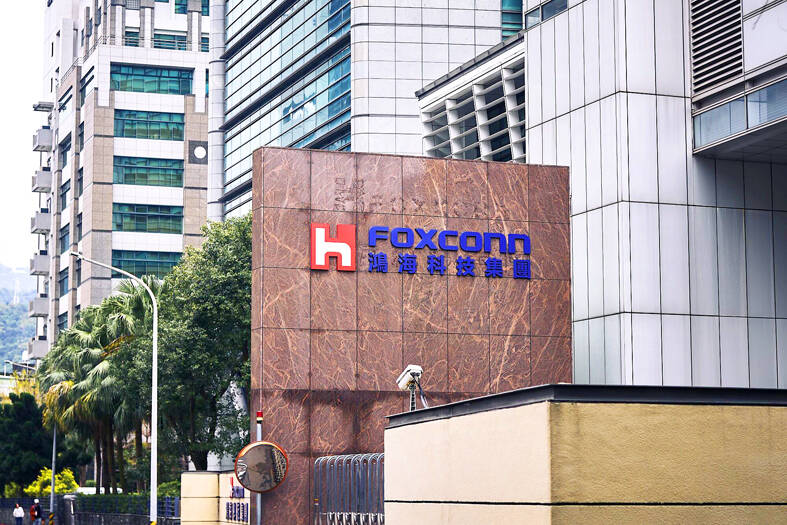Hon Hai Precision Industry Co (鴻海精密) has increased its investment in India and Vietnam, which sources said were likely made to expand capacity for Apple Inc products and artificial intelligence (AI) servers.
Since Oct. 25 last year, the company has bought US$32.26 million in equipment from Apple Operations Ltd for its Indian operation through subsidiary Foxconn Hon Hai Technology India Mega Development Private Ltd, Hon Hai said in a regulatory filing on Tuesday.
While the company said the purchases were made to meet operational needs, the sources believed the investment was made to support AirPods production for Apple in India.

Photo: Bloomberg
India’s news media last month reported that Hon Hai was scheduled to begin manufacturing AirPods this month in a facility in Hyderabad, the capital and largest city of the Indian state of Telangana.
The reports said AirPods would be the second Apple product Hon Hai rolls out in India after iPhones.
The sources said Hon Hai, also known globally as Foxconn Technology Group (富士康科技集團), has repeatedly purchased equipment from Apple Operations, and that previous purchases were for iPhone production in India.
Hon Hai has also injected an additional US$23.4 million into Fulian Precision Technology Co in Vietnam through another subsidiary — Ingrasys (Singapore) Pte Ltd — as a long-term investment, the filing showed.
Fulian Precision was set up in 2023 in Vietnam’s Quang Chau Province, and specializes in producing servers and server racks, as well as communications devices.
The sources said Hon Hai’s increasing investments in Vietnam were aimed at expanding its AI server production.
AI servers are expected to account for 50 percent of Hon Hai’s total server revenue and seize a more than 40 percent share of the global AI server market this year, as the company expands AI server capacity in several areas, including Taiwan, the US, Mexico and Vietnam, it said.

Taiwan’s long-term economic competitiveness will hinge not only on national champions like Taiwan Semiconductor Manufacturing Co. (TSMC, 台積電) but also on the widespread adoption of artificial intelligence (AI) and other emerging technologies, a US-based scholar has said. At a lecture in Taipei on Tuesday, Jeffrey Ding, assistant professor of political science at the George Washington University and author of "Technology and the Rise of Great Powers," argued that historical experience shows that general-purpose technologies (GPTs) — such as electricity, computers and now AI — shape long-term economic advantages through their diffusion across the broader economy. "What really matters is not who pioneers

In a high-security Shenzhen laboratory, Chinese scientists have built what Washington has spent years trying to prevent: a prototype of a machine capable of producing the cutting-edge semiconductor chips that power artificial intelligence (AI), smartphones and weapons central to Western military dominance, Reuters has learned. Completed early this year and undergoing testing, the prototype fills nearly an entire factory floor. It was built by a team of former engineers from Dutch semiconductor giant ASML who reverse-engineered the company’s extreme ultraviolet lithography (EUV) machines, according to two people with knowledge of the project. EUV machines sit at the heart of a technological Cold

TAIWAN VALUE CHAIN: Foxtron is to fully own Luxgen following the transaction and it plans to launch a new electric model, the Foxtron Bria, in Taiwan next year Yulon Motor Co (裕隆汽車) yesterday said that its board of directors approved the disposal of its electric vehicle (EV) unit, Luxgen Motor Co (納智捷汽車), to Foxtron Vehicle Technologies Co (鴻華先進) for NT$787.6 million (US$24.98 million). Foxtron, a half-half joint venture between Yulon affiliate Hua-Chuang Automobile Information Technical Center Co (華創車電) and Hon Hai Precision Industry Co (鴻海精密), expects to wrap up the deal in the first quarter of next year. Foxtron would fully own Luxgen following the transaction, including five car distributing companies, outlets and all employees. The deal is subject to the approval of the Fair Trade Commission, Foxtron said. “Foxtron will be

INFLATION CONSIDERATION: The BOJ governor said that it would ‘keep making appropriate decisions’ and would adjust depending on the economy and prices The Bank of Japan (BOJ) yesterday raised its benchmark interest rate to the highest in 30 years and said more increases are in the pipeline if conditions allow, in a sign of growing conviction that it can attain the stable inflation target it has pursued for more than a decade. Bank of Japan Governor Kazuo Ueda’s policy board increased the rate by 0.2 percentage points to 0.75 percent, in a unanimous decision, the bank said in a statement. The central bank cited the rising likelihood of its economic outlook being realized. The rate change was expected by all 50 economists surveyed by Bloomberg. The